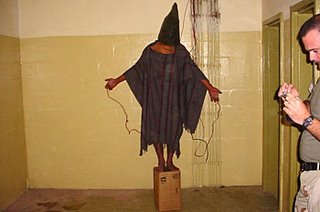 “Would it be permissible, in the name of a good cause, for the "good guys" to legalize the raping of 5-year-olds?”
“Would it be permissible, in the name of a good cause, for the "good guys" to legalize the raping of 5-year-olds?”Moral relativism and the debate about torture by A. Barton Hinkle in today’s Richmond Times Dispatch:
TORTURE'S DEFENDERS say the U.S. would torture people only for good reasons -- to stop a terrorist attack -- rather than, say, to force someone to renounce his faith. In other words, the ends justify the means. But good ends do not justify wrongful means. This isn't the place for a lengthy dissection of
consequentialist vs. deontological ethics. Simply note that even when the
consequences of a given course of action can be known with per- fect certainty
-- which they never can -- con- sequentialism runs counter to all defensible
moral reasoning. Is it ethically permissible to kill an innocent person in order
to harvest his organs and thereby save the lives of five other people? Conse -
quentialist, ends-justify-means ethics says, yes.
Torture advocates rely principally on two other arguments: First, that
enemy combatants do not abide by the rules of warfare, and therefore they do not
fall under the protective umbrella of the Geneva Conventions. Yet as Heather Mac
Donald of the Manhattan Institute pointed out recently: "The very fact that
detainees are violating the rules of war, that they are not wearing uniforms or
any identifying insignia, makes the possibility of factual error in who you pick
up much more severe than when you are capturing a traditional uniformed
enemy."
Just so. Note the case of Maher Arar, whom the U.S. kidnapped and
handed over to the Syrians for 10 months of torture -- and whom the Canadian
government recently found innocent of any terrorist leanings. Note the many
detainees who have been released from Camp X-Ray at Guantanamo Bay, Cuba, long after their initial capture in the fog of battle or on the suggestion of an
unreliable informant. They were unjustly held; imagine if they had been tortured
for months on end as well.
Such cases illustrate the fallacy underlying the other principal
defense of torture. Torture's advocates act as though "coercive interrogation"
would be used only against known terrorists in ticking-time-bomb scenarios. Yet
the Bush administration has not been seeking authority to torture only in a few
limited cases. Nor do documented cases of torture by U.S. authorities match such
a scenario. Five years into the War on Terror -- the "Long War," as it is being
called -- torture is virtually never an urgent necessity to obtain information
available no other way.
THE SCENARIO is often persuasive, however, because it is one of the few
instances in which torture can be considered an act of self-defense -- and if
self-defense is morally permissible, which it is, then torture must be. So the
red herring of the ticking time-bomb is waved, and defenders of torture draw
parallels, as Golberg does, to homicide: There are gradations of killing, and
homicide in self-defense is not so heinous as cold-blooded murder. Likewise,
they say, there are no bright lines regarding torture, only shades of gray. What
is taboo shouldn't always be.
Well. In Christianity Today's "Five Reasons Torture Is Always Wrong,"
David Gushee quotes Immanuel Kant on the "natural . . . disposition to argue
against [the] strict laws of duty and to question their validity, or at least
their purity and strictness, and, if possible, to make them more accordant with
our wishes and inclinations, that is to say, to corrupt them at their very
source, and to entirely destroy their worth." As a grindstone to hone that
observation, consider not homicide -- against which there is no bright-line
societal taboo -- but child molestation. Would it be permissible, in the name of
a good cause, for the "good guys" to legalize the raping of
5-year-olds?
2 comments:
Go back to the Taguba report and read the citations to the service members working at Abu Garib.
The system worked as it was supposed to. The saw abuse, they reported it, the Army investigated and brought charges, and those folks now in Leavenworth doing hard time.
Few militarys can claim they work like that.
The Chicago Police Dept can't even work like that (witness the Jon Burge case which went on for years and Burge now enjoying comfortable retirement in Fl).
Now, google around for Sheik Kalid Muhammed who butchered Danny Pearl and hacked him into ten pieces. We took Muhammed to Gitmo and somewhere along the line waterboarded the guy which made him take and yield information on more people who given their druthers would just as soon hack is into pieces.
The morality is absolute. Whether or not waterboarding is torture can be disputed. But the picture you show was prison staff run amok...
Not to mention the fellow here with the hood alive and well, with a law suit filed against Rumsfeld...
....not Pearl's cicrumstance at all.
Post a Comment